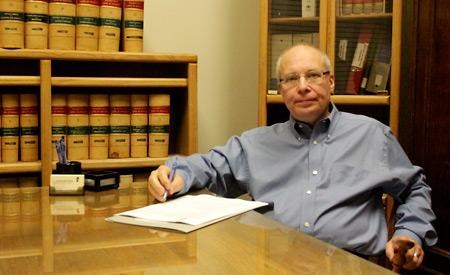Are the seven Powell River-based law practices listed in the Yellow Pages enough to service a city that, at last census, contains 19,906 residents? People in the profession are saying yes—but maybe not for long.
A recent article in the Vancouver Sun has dubbed lawyers in rural British Columbia an “endangered species.” Putting them in peril is something called the “greying of the profession,” referring to the rising average age of lawyers in rural or remote communities.
This phenomenon is made worse by law graduates’ preference for the big firms of large cities. A 2007 survey found that 80 per cent of articled students in BC chose to practice in Metro Vancouver. Seventy-four per cent of them stayed there. This kind of urban concentration leaves aging lawyers in less-populated areas with no one to replace them.
Surveys by the Law Society of BC show that the average age of lawyers in the Vancouver area is 47. David Garling, who runs a firm of the same name, said he thinks the average age for Powell River lawyers is higher on the scale. “It’s probably up in the 50s,” he said, “but there are a couple of really young ones too.”
He’s right. The average age of lawyers in Powell River is 54, only about 10 years away from the legal retirement age.
Gregory Reif, who works under the same name and is himself 57, explained how he and other Powell River lawyers had to take on a few cases from Sechelt due to several lawyers in that community’s smaller bar retiring around the same time. He said he doesn’t think Powell River should be worried about a retirement shortage though, because many lawyers continue to work past the average retirement age.
“There’s always the option of hiring an out-of-town lawyer if none in Powell River are available, although sometimes the client has to pay the lawyer’s travel expenses to Powell River, which is an additional cost,” he added.
But with only 11 of them working in the entire city, is Powell River already lacking in lawyers? Reif and Garling agreed that although most lawyers have a full schedule, they can handle the workload of the city.
“There are fewer lawyers per capita in Powell River than in some communities in the province,” Reif acknowledged. “However, the current contingent of lawyers is able to handle the volume of legal work that is out there.”
“I think all the lawyers here are reasonably busy,” said Garling. In regard to turning away clients, he said it doesn’t happen very often, but “sometimes you have to put a cap on it.”
The BC branch of the Canadian Bar Association did implement a program providing funding for law students to be placed in remote communities throughout the province, but Powell River hasn’t seen any benefits yet. Michael Jakerman, careers officer of the Rural Education and Access to Lawyers (REAL) initiative, said through email that although Powell River is certainly a place of interest for the program, there hasn’t been a placement here since the initiative started in 2009.
Considering that only 13 out of the more than 100 rural or remote communities in BC received a placement this summer, Powell River might not be seeing benefits anytime soon.



